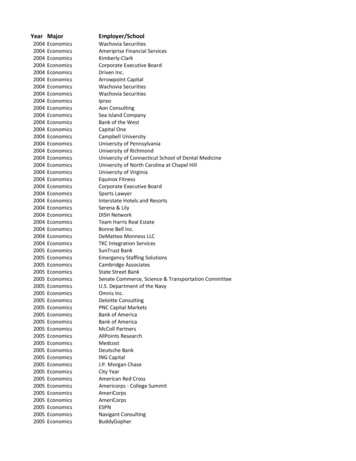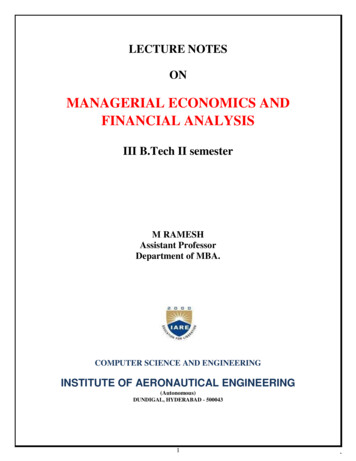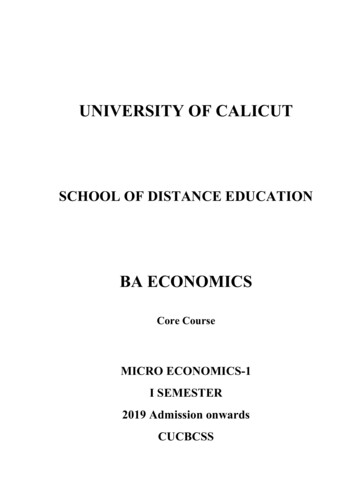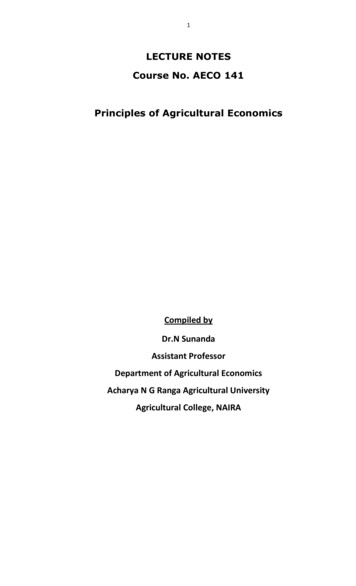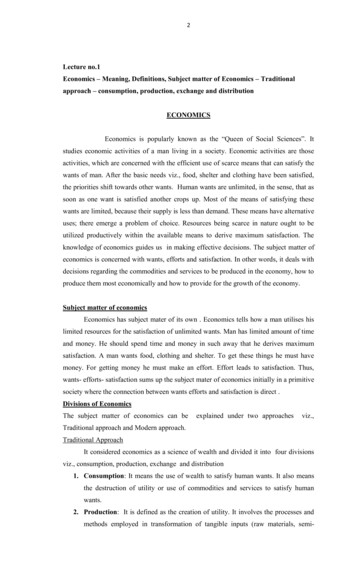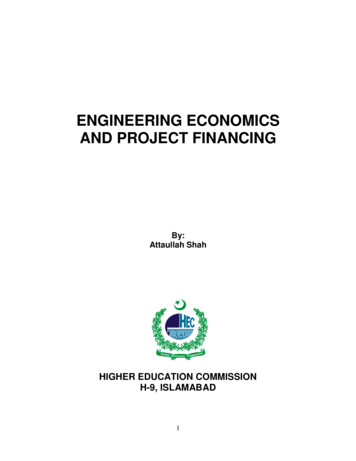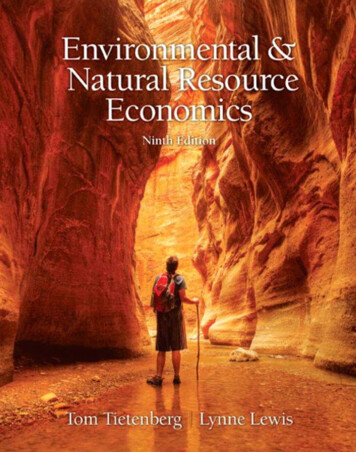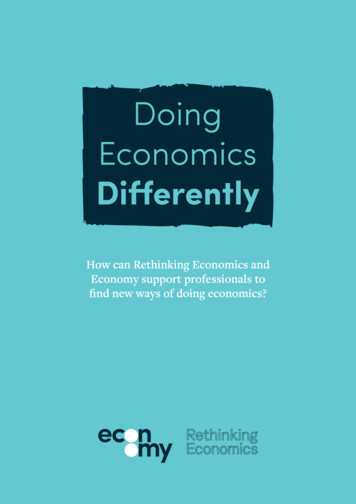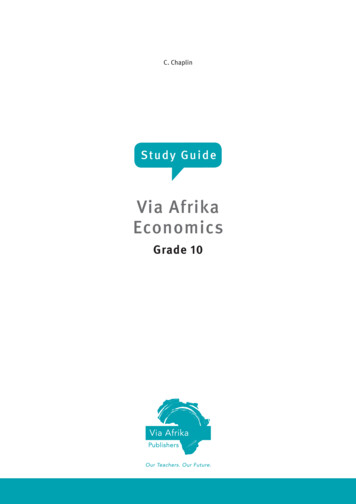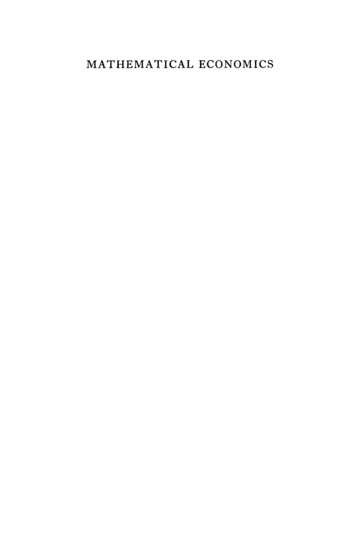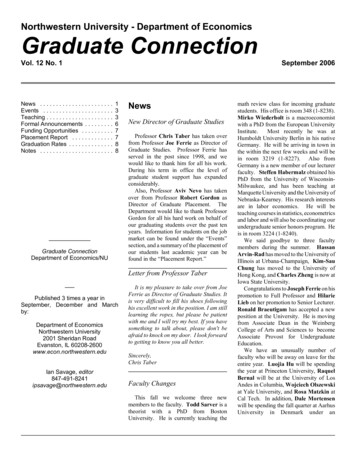
Transcription
Northwestern University - Department of EconomicsGraduate ConnectionVol. 12 No. 1News . . . . . . . . . . . . . . . . . . . . . . .Events . . . . . . . . . . . . . . . . . . . . . .Teaching . . . . . . . . . . . . . . . . . . . . .Formal Announcements . . . . . . . . .Funding Opportunities . . . . . . . . . .Placement Report . . . . . . . . . . . . .Graduation Rates . . . . . . . . . . . . . .Notes . . . . . . . . . . . . . . . . . . . . . . .September 200613367788Graduate ConnectionDepartment of Economics/NUNewsNew Director of Graduate StudiesProfessor Chris Taber has taken overfrom Professor Joe Ferrie as Director ofGraduate Studies. Professor Ferrie hasserved in the post since 1998, and wewould like to thank him for all his work.During his term in office the level ofgraduate student support has expandedconsiderably.Also, Professor Aviv Nevo has takenover from Professor Robert Gordon asDirector of Graduate Placement. TheDepartment would like to thank ProfessorGordon for all his hard work on behalf ofour graduating students over the past tenyears. Information for students on the jobmarket can be found under the “Events”section, and a summary of the placement ofour students last academic year can befound in the “Placement Report.”Letter from Professor TaberPublished 3 times a year inSeptember, December and Marchby:Department of EconomicsNorthwestern University2001 Sheridan RoadEvanston, IL 60208-2600www.econ.northwestern.eduIan Savage, editor847-491-8241ipsavage@northwestern.eduIt is my pleasure to take over from JoeFerrie as Director of Graduate Studies. Itis very difficult to fill his shoes followinghis excellent work in the position. I am stilllearning the ropes, but please be patientwith me and I will try my best. If you havesomething to talk about, please don't beafraid to knock on my door. I look forwardto getting to know you all better.Sincerely,Chris TaberFaculty ChangesThis fall we welcome three newmembers to the faculty. Todd Sarver is atheorist with a PhD from BostonUniversity. He is currently teaching themath review class for incoming graduatestudents. His office is room 348 (1-8238).Mirko Wiederholt is a macroeconomistwith a PhD from the European UniversityInstitute.Most recently he was atHumboldt University Berlin in his nativeGermany. He will be arriving in town inthe within the next few weeks and will bein room 3219 (1-8227). Also fromGermany is a new member of our lecturerfaculty. Steffen Habermalz obtained hisPhD from the University of WisconsinMilwaukee, and has been teaching atMarquette University and the University ofNebraska-Kearney. His research interestsare in labor economics. He will beteaching courses in statistics, econometricsand labor and will also be coordinating ourundergraduate senior honors program. Heis in room 3224 (1-8240).We said goodbye to three facultymembers during the summer. HassanArvin-Rad has moved to the University ofIllinois at Urbana-Champaign, Kim-SauChung has moved to the University ofHong Kong, and Charles Zheng is now atIowa State University.Congratulations to Joseph Ferrie on hispromotion to Full Professor and HilarieLieb on her promotion to Senior Lecturer.Ronald Braeutigam has accepted a newposition at the University. He is movingfrom Associate Dean in the WeinbergCollege of Arts and Sciences to becomeAssociate Provost for UndergraduateEducation.We have an unusually number offaculty who will be away on leave for theentire year. Luojia Hu will be spendingthe year at Princeton University, RaquelBernal will be at the University of LosAndes in Columbia, Wojciech Olszewskiat Yale University, and Rosa Matzkin atCal Tech. In addition, Dale Mortensenwill be spending the fall quarter at AarhusUniversity in Denmark under an
September 2006Graduate Connection O 2arrangement that will continue for anumber of years.Mark Witte and his wife Megan welcomeda daughter Eleanor.Recent HonorsStaff ChangesCongratulations to Joel Mokyr on theawarding of the 2006 Heineken Prize inHistory by the Dutch Royal Academy.The Academy awards six prizes indifferent disciplines every other year. Joelreceived his award for his work on theorigins of the modern industrial economy.The prize will be awarded in a ceremonyin Amsterdam in September.The annual Review of Economic Studiestour, which features the seven leading PhDstudents on the market, included ToddSarver who has joined us as an AssistantProfessor, and our own Jakub Kastl whowas hired by Stanford University. Thetour, in May, went to the Universities ofOslo, Essex and Tel Aviv.Congratulations to Lillian Kamal,Hilarie Lieb, and Eric Schulz on theirelection to the annual ASG Faculty HonorRoll on the basis of their teaching. Inaddition, Ronald Braeutigam was electedto the honor roll for his administration ofthe WCAS Office of Studies.We are also pleased to report that SorinMaruster was awarded the WCASOutstanding Graduate Student TeacherAward for 2005-06. This is one of onlythree awards (one for each division of theCollege) awarded each year to graduatestudents for their activities as a TA or asan instructor. Sorin is also the TeachingAssistant Fellow training our new teachingassistants.Second year graduate student LansingKent has won a National ScienceFoundation Fellowship.HannaHalaburda has been awarded a WCASDissertation Year Fellowship, MarianneHinds was awarded a NorthwesternGraduate Research Fellowship, andTomasz Strzalecki won a NorthwesternPresidential Fellowship, the highest honorthat NU can award to a graduate student.There have been a number of recentbirths. In March Silvia and Alex Mongewelcomed a son Gabriel. In July adaughter Beatrice was born to Daniela andAlessandro Pavan. Finally in AugustAt the end of July, our DepartmentAssistant for the past three years, LynetteHorn left the University to start her ownbusiness. We are pleased to announce thatwe have hired Margene Lehman toreplace her.She is currently theDepartment Assistant in the Department ofReligion, and will be starting on Monday,September 11.There have been changes in our mainoffice. Sara Gasbarra was promoted andhas moved to the School of Medicine onthe Chicago campus, and BrianHernandez has returned to Texas toundertake a masters degree in music.Charles Nash joined us in early August toreplace to take over Brian’s duties, andJohn Affrunti has just taken over ouraccounting position. He has sixteen yearsof experience working in the accountspayable departments of financial servicescompanies. In addition, he has also spentsome time managing the accounts of NU'sGeological Sciences Department. JohnAffrunti will be working out of room 304.James Burns will now be located in themain office, working with Charles Nash.Hanson’s work deals with relatinge c o n o mi c t h e o r y t o o b s e r v e dmacroeconomic and asset market behaviorand modeling optimal policy underuncertainty. He will be in residence in theFall Quarter of 2007. While he is here, hewill give a public lecture, and a conferencewill be organized relating to his work.Hansen is the seventh winner of theprize. Previous winners were PeterDiamond, Thomas Sargent, RobertAumann, Daniel McFadden, EdwardPrescott, and Ariel Rubinstein.Welcome to our First-year GradStudents!The department will be welcomingChris Chambers, a theorist from CalTech, for a short visit from September 19 toSeptember 22. He will be in room 3234.In addition we will be welcomingvisitors as part of our lecture series ininternational trade and developmenteconomics. See the announcements underthe “Teaching” section.Welcome to the Department ofEconomics and to Evanston. We hope thatyour years with us are productive andfulfilling. Please take the opportunity tomix with other graduate students and thefaculty. A good way of doing this is at theTGIF held every Friday at 5:00PM in thelounge (Andersen Hall 327).The Director of Graduate Studies hasprepared some information on goals forfirst year students, which answers manyfrequently asked questions. This is postedon our web site under the “PhD - CurrentStudents” section. In addition the web sitediscusses the English languagerequirements for appointment to TeachingAssistantships, the primary form offinancial support in years two to five.Please make sure you are aware of theserules, and place a high priority on makingsure that you comply. In the past,otherwise qualified students have goneunfunded because they did not meet thelanguage requirements on time.The Director of Graduate Studies willhold an orientation for first year graduatestudents as part of the Math Review class.Nemmers PrizeDepartmental ManagementThe Department is pleased to announcethat Professor Lars Peter Hansen of theUniversity of Chicago is the next recipientof the Erwin Plein Nemmers Prize inEconomics. The biannual honor isbestowed on an outstanding economist whohas yet to win the Nobel Prize. ProfessorThe management team of theDepartment has seen a number of changes,some of which have been reported earlierin this newsletter. The team is:Robert Porter - ChairIan Savage - Associate ChairVisitors
September 2006Chris Taber - Director of GraduateStudiesIgal Hendel - Director of GraduateAdmissionsAviv Nevo - Director of GraduatePlacementJoe Ferrie - Director of GraduateComputingRobert Gordon - Chair of theUndergraduate Studies CommitteeMark Witte - Director of UndergraduateStudiesElie Tamer - Chair of the JuniorRecruiting Committee.EventsUniversity Orientation for FirstYear StudentsThe Graduate School will hold a generalorientation for all new graduate studentsfrom 9AM to 5PM at the Norris UniversityCenter on Monday, September 11.Information will be available on campusand community resources, health services,financial issues and other practical issues.The orientation will be followed by apicnic. Initial registration will be held inthe Pick-Staiger Concert Hall next to theNorris Center.Teaching Assistant TrainingA two-afternoon program will be heldon both Tuesday and Wednesday,September 12 and 13 for the training ofnew Teaching Assistants.This isorganized by the Searle Center forTeaching Excellence. All TAs who will beteaching for the first time this year, or whomissed last year's program, are required toattend. The training will last from 1PM to5PM. Go to Lecture Room 3 in theTechnological Institute on the 12th for ageneral orientation. You will then go tospecialized sessions for Economics TAsled by Sorin Maruster, one of theDepartment’s outstanding TAs.If you are an "international" TA, youwill also need to attend a session onWednesday, September 13 from 10AM toGraduate Connection O 3noon in the Technological Institute roomL150. In addition, there will be a briefmeeting specifically for the “international”Economics TAs on Monday, September 18at 12:30PM in Andersen Hall 3245 (justbefore the field day orientation for allsecond year students which starts at 1pm).By international TA we mean anyone whodid not attend a college in the United Statesor Canada for all years of theirundergraduate degree. These sessions willbe an introduction to the “InternationalScholars Program (ISP).” The Departmentregards your involvement in this programas mandatory if you are an "international"TA as defined above.Department Orientation for FirstYear StudentsStart-of-Year ReceptionFaculty, staff, graduate students, andtheir families are all invited to the start ofyear buffet and reception that that will beheld in the Louis Room on the secondfloor of the Norris University Center at7PM on Thursday, October 12.This reception will also feature theaw a r d in g o f the Department'sDistinguished Teaching Assistant awardsfor last year. The winners will receive acertificate and a year's subscription to aleading academic journal.Department Wide SeminarThe Director of Graduate Studies willhold an orientation for first year graduatestudents on Thursday, September 14 in thefinal hour of the morning’s lecture of theMath Review Class.For a variety of reasons there will not bea department-wide seminar speaker thisfall. However, we are pleased to announcethat Professor Thomas Sargent of NewYork University and the Hoover Institutionhas agreed to visit us as the Spring 2007department-wide seminar speaker duringthe week of April nd year students are invited toattend a session on Monday, September 18from 1PM - 4PM in Andersen Hall 3245.Presentations will be made on therequirements for the Ph.D. degree, fundingmechanisms, and the 501 seminar. Shortpresentations will then be made by facultydescribing the field course choicesavailable in the Department and withinKSM. (There will be a brief meeting fornew “International TAs” at 12:30PMimmediately prior to the generalorientation.)Orientation for Students on the JobMarketAviv Nevo, Director of GraduatePlacement, will be holding an orientationsession for students who are thinking aboutgoing on the job market on Monday,September 25 at 5:15PM in Andersen Hall3245. For more details see the PlacementReport below.Course Offerings 2006-07The schedule for graduate courses forthe coming year is shown on the “classes”page of the Department’s web site, alongwith the timings for each quarter.Fall Quarter ChangesPlease note three changes to thisquarter’s offerings.First, ProfessorHorowitz’s 481-1 has been moved to itstraditional timing in the evenings. Second,Professor Siniscalchi’s theory class hasbeen canceled (he will now be teachingEconomics 410-2). However, we arepleased to announce that Professor Reiterwill be offering a theory class (see thedescription of Economics 415-1 below).First year students should note that thelecture section of Economics 410-1 hasmoved to our own lecture room (Andersen3245). The discussion sections remain asoriginally scheduled.
September 2006Graduate Connection O 4This Quarter’s Course DescriptionsThe Department has a policy to avoidthe problem of excessive awarding ofincomplete grades. Please see our web sitefor a complete statement. Report anyproblems to the Director of GraduateStudies.Economics 415-1Advanced MicroeconomicsProfessor ReiterMW 2-3:30Economics 450-1Industrial Organization and PricesProfessors Nevo & WhinstonTTh 1-3AAH 3245AAH 3204The course will study systematicprocedures--algorithmic processes--fordesigning decentralized, informationallyefficient mechanisms that achieve prespecified performance goals. Also, givena mechanism that implements a goalfunction in Nash equilibrium, we will useour algorithm to construct aninformationally efficient decentralizedmechanism that implements the goalfunction in correlated equilibrium.The text for the course is: Hurwicz andReiter Designing Economic Mechanisms(Cambridge University Press, 2006).Economics 416-1Advanced MacroeconomicsProfessor ChristianoMW 1-3Grading will be based on a paper.Students may either attempt to replicate andextend an empirical labor economics paper,or they may try a more original empiricalproject. This project can be done eitheralone or in groups.An introduction to industrialorganization theory and empirical analysis.Topics include: monopoly pricing; pricediscrimination; oligopoly price and output;empirical studies of structure, pricing andprofitability; estimation of productionfunctions; estimation of demand fordifferentiated products; hedonics andwelfare; introduction to antitrust andhorizontal antitrust issues. The emphasiswill be on the theory and estimation ofgame theoretic models, with an emphasison recent developments in the field.Evaluation is based on several problemsets and a final exam. Students areexpected to read selected papers, many in acourse packet, plus the required text: JeanTirole The Theory of IndustrialOrganization (MIT Press, 1988).AAH 3245No description received.Economics 440-1Economics of the Labor MarketProfessor TaberMW 11-1AAH 3245This is the first course in a two semestersequence in labor economics. The secondwill be taught in the Spring by ProfessorMortensen. The goal of this course is tosythesize theory, econometrics, andemprical work in labor economics. Theemphasis of the work will be on thedeterminants of wages. Topics will includeequalizing differentials, human capital,labor supply, and the changing wagestructure.Economics 481-1EconometricsProfessor HorowitzMW 6-8pmAAH 3245Nonparametric and semiparametricmethods in econometrics. Much appliedresearch in economics consists ofestimating conditional mean or quantilefunctions.Examples include wageequations and binary response models ofwhether a person is employed or not. Themost frequently used estimation methodsassume that the function of interest isknown up to a finite-dimensional parameterthat is estimated by, say, ordinary leastsquares if the model is linear or maximumlikelihood in the case of a binary logit orprobit model. Models in which thefunction of interest is known up to a finitedimensional parameter are calledparametric and are widely used, but theycan fit data very badly and yield highlymisleading results. Fully nonparametricestimation, in which function of interest isassumed to be smooth but otherwiseunknown, minimizes the possibility ofspecification error and is very useful whenthere are only one or two explanatoryvariables.But fully nonparametricestimation is very imprecise when there aremore than two or three right-hand sidevariables. Semiparametric methods are amiddle ground between parametric andfully nonparametric methods. They makeassumptions that are weaker than those ofparametric models but stronger than thoseof fully nonparametric methods. By doingthis, they obtain good estimation precisionwhile greatly reducing the risk ofspecification errors and misleading results.This course will present the theory andgive examples of the performance of awide variety of non- and semiparametricestimation methods. It will cover fullynonparametric estimation, nonparametricadditive models, single-index models, andpartially linear models. The course willinclude real-data applications as well astheory. Many topics will be on the frontierof current research in statistics andeconometrics.Students will be asked to make apresentation, work one or two problemsets, and write a paper in which non- orsemiparametric methods are applied to realdata. There will be no examinations. Thereading material will consist of publishedarticles, working papers, and chapters inthe Handbook of Econometrics.Economic 482Time Series MethodsProfessor PrimiceriMW 9-11AAH 3245This is a course on macroeconometrics(or, if you wish, applied time series). Theemphasis is on Bayesian methods toconduct inference in dynamic models.Topics include univariate and multivariateautoregression (AR and VAR) models,
September 2006Graduate Connection O 5structural VARs, time varying parametersand stochastic volatility models, estimationof linear and nonlinear DSGE models andsome non-rational expectationseconometrics. For each topic, we willdiscuss a number of applications.Evaluation is by homeworks and a finaltake home exam.Economic 498-1Advanced TopicsProfessor MoriguchiTTh 9-11MECS 460-1Foundations of Management EconomicsProfessor VohraTTh 4-6LEV 586AAH 3204This course will satisfy theDepartment’s economic historyrequirement, and can be combined with420-1 or 420-2 to form a field in economichistory. The course compares economicinstitutions across time and places andexplores the dynamics of institutionalchange. It is also an introduction to theapplication of game theory to historicalanalysis. Topics include: agriculturaltenancy, technological innovations,business corporations, employmentcontracts, and supplier relations.Evaluation is based on class participation,several written reports,and a research paper.MECS 449-1Competitive StrategyProfessor SpulberTF 3:30-5strategy perspective for economic theoriesof the firm.The text is Daniel F. Spulber, MarketMicrostructure (Cambridge UniversityPress, 1999 – order paperback onAmazon), with additional readings to bedistributed in class.LEV 166The course is the first quarter of thegraduate strategy sequence. The coursewill introduce PhD. students to economicanalysis of competitive strategy. Thecourse will focus on the economic theoryof the firm. The course will reviewexisting theories of the firm including theneoclassical, industrial organization,contractual, and organizational incentivetheories of the firm. The course then willpresent a unified theory of the firm. Thecourse will examine such topics as marketmaking, intermediation, contracts andagency in the context of the theory of thefirm. In addition, the course will examinethe consequences of a managementAll mathematical problems in economictheory reduce to either checking thefeasibility of a system of inequalities,finding a point that maximizes a givenfunction or a fixed point. The threeproblems are, in general, quite difficult.However, if one is prepared to makeassumptions about the nature of theunderlying function (say it is linear, convexor continuous) and the nature of theunderlying set of points (convex, compactetc.) it is possible to provide answers andvery nice ones at that. This course is aboutthe answers as well as therelationships between them.Some of what the course will cover(without the embellishments andintuitions) can be found in themathematical appendix of Mas-Collel,Whinston and Green’s MicroeconomicTheory or Rangarajan Sundaram's FirstCourse in Optimization Theory. All of theideas will be illustrated using some of theimportant models of economic theory(Black-Scholes, auctions, stable matchings,principal-agent etc.) as well asamusements (the game of Hex).There will be regular homeworkassignments and a final exam. Please email Prof. Vohra r-vohra@kellogg.northwestern.edu if you intendto take the course.MECS 465Contract Theory and Mechanism DesignProfessor EsoTBDLEV 586Organizational meeting, Thursday Sept21st at noon in LEV 561. The coursecovers recent developments in contracttheory and mechanism design with aspecial emphasis on auctions and thetheory of communication. Its successiveparts are: moral hazard models (static anddynamic), asymmetric information models(static and dynamic), single- and multigood auctions, common agency, andmodels of communication. Assessmentwill be by four problem sets and a finalexam. Readings: Salanie Economics ofContracts (MIT Press, 2005) and selectedarticles.MECS 466Social Choice and Voting ModelsProfessor HarstadTBDLEV 586Organizational meeting, WednesdaySept 20th at 8am in LEV 586. Economicpolicy cannot be understood by economicsalone and, to be successful, it must take thepolitical game into account. This coursestarts by introducing the tools of socialchoice, and concludes by discussing recentresearch on political economics. We will(i) take a formal approach to collectivechoice problems, (ii) analyze voting andbargaining in politics, (iii) study gamesbetween politicians and voters, and (iv)compare political institutions as differentrules of the game. Teaching is based on thebooks by Austen-Smith and Banks PositivePolitical Theory (Parts I and II, Univ. ofMichigan Press, 1999, 2005) as well asrecent research articles.Finance 485Introduction to Financial TheoryProfessor SkiadasMTh 2-4AAH 4214This course is an introduction to assetpricing theory and portfolio choice. Thefirst part of the course introduces arbitragetheory, including state prices, equivalentmartingale measures, beta pricing and theassociated mean-variance analysis. Thesecond part deals with optimalconsumption/portfolio choice of agentsand competitive equilibrium in the context
September 2006Graduate Connection O 6of general preferences. The third partconsiders more detailed preferencestructures, including the theories of fundseparation and Gorman aggregation, andexpected utility theory. Time permitting,the course concludes with an introductionto rational expectations models withasymmetric information.Proficiency in elementary linear algebraand probability theory is required, as issome knowledge of basic nonlinearoptimization theory. The course will basedon the instructor's notes, which will behanded out in class. The course grade isbased on weekly assignments, and a takehome final.Finance 486Seminar in Corporate FinanceProfessor HertzbergTBATBAAn introduction to corporate financetheory and empirical analysis. Topicsinclude: corporate financing decisions;corporate investment decisions; financialcontracting; corporate finance and theproduct market; financial intermediation;security design; managerial incentives;corporate governance. Emphasis will beplaced on recent theoretical developmentsin the field and empirical tests of theseideas. The class will encourage students toidentify questions for future research.Evaluation will be by problem sets anda final exam.Trade/Development SpeakersAgain this year the Department willhost a visiting speaker series ininternational trade and developmenteconomics. Part of this series will be heldin the Fall Quarter, and the remainder laterin the year. Graduate students can takethis lecture series for credit by enrollingfor an Independent Study with ProfessorMatsuyama in the Spring Quarter. ThisIndependent Study can be combined witha course in the Economics 425 or 460sequence to satisfy a field requirement.Besides attending the lectures, studentsmust also write a short summary of theresearch presented by all the speakers(about 2x5 10 pages), and prepare aresearch proposal (of five to ten pages) ona related topic.The lecture series consists of about fivespeakers. Each of them will stay for one ortwo weeks, and give three to six hours ofpresentation.So far, we have two speakers scheduledfor the fall quarter. Pol Antras of HarvardUniversity will be here for the weeks ofSeptember 25 and October 23. JaumeVentura of the Universitat Pompeu Fabrain Spain will be here for the week ofOctober 2. They will be giving lectures onTuesday and Thursdays during the weeksthey are here from 11AM to 1PM in AAH3245. Full details of additional speakerswill be given in future editions of theGraduate Connection.Economics 501 SeminarThe 501 seminar is the mechanism bywhich students meet the Department’srequirement that they write papers in twodifferent major fields (in addition to thehistory paper requirement) prior to doctoralcandidacy. Full details of this requirementand practical information on the seminarare shown on our web site.For 2006-07 the seminar will continue tobe run by Professor Alessandro Pavan.The seminar will meet on Tuesday andThursdays at 6PM in the Lecture Room(Andersen 3245) in both the Fall andSpring Quarters. There will be onepresentation each day and the seminar willlast for one hour including the questionand-answer period.This fall third-year students (excludingthose who presented last Spring) will bepresenting the paper that they submittedearlier this summer. An initial draftschedule with random assignments ofstudents to specific dates for both Fall andSpring is listed below. Pareto-improvingexchanges are permissible, and should becommunicated to Professor nikova5/21O’ConnorHeffner5/28XiongChenFormal AnnouncementsFunding GuidelinesThe Department has formal rules for theallocation of funding for students in yearstwo through five. This document is postedon our web site. Please read this documentas the Department strictly enforces thesefunding criteria.
September 2006Preliminary ExaminationsThe Department has rules on thenumber of times that students are allowedto take prelim examinations, and theconditions for such retaking. These affectwhether some second and third yearstudents will be allowed to continue in theprogram. The rules are posted on our website. Please make sure that you arefamiliar with them.Dates for future prelim examinationshave been set. The ordering of the threeexaminations rotates each year. For thecoming year, the dates are:Spring 2007 SittingWed June 13MicroeconomicsWed June 20MacroeconomicsWed June 27EconometricsAll examinations will be held 1PM - 4PM.Fall 2007 SittingTues Sept 4MicroeconomicsWed Sept 5MacroeconomicsThur Sept 6EconometricsAll examinations will be held 1PM - 4PM.TA Periods in ResidenceEach quarter that you are a TA, youmust be in Evanston from the first day ofclasses until the Monday afterexaminations end (which is the day thatgrades are filed). In the past people haveleft early and arrived back late, in somecases without informing the instructor. TheDepartment will not tolerate this. Youmust arrange your vacation airline flightsso as to be able to fulfill your duties. Thisis especially true as you make travelarrangements for the coming holidayseason. Failure to do so will be groundsfor rescinding your TAship. For thecoming year the dates for which you mustbe in attendance are:Fall:Tues Sept 19 - Mon Dec 11Winter: Wed January 3 - Mon March 19Spring: Mon March 26 - Mon June 11Graduate School DeadlinesNovember 3 is the last day for return ofGraduate Connection O 7the Application for a Degree for allcandidates who expect their degrees tobe awarded in December.December 1 is the last day for submissionof the COMPLETED dissertation and allsupporting materials to the GraduateSchool for students who expect toreceive the Ph.D. degree in December.December 8 is the last day for receipt ofthe Final Examination Report and anyChange of Grade forms to the GraduateSchool for Master's candidates whoexpect their degrees to be awarded inDecember.Funding OpportunitiesTeaching for Summer Session 2007Application forms for teaching in theSummer Session 2007 will be circulated toall graduate students in the third year andabove in early October. Appointments tothese positions will be made by theDirector of Graduate Studies and theAssociate Chair. This
College of Arts and Sciences to become Associate Provost for Undergraduate Education. We have an unusually number of faculty who will be away on leave for the entire year. Luojia Hu will be spending the year at Princeton University, Raquel Bernal will be at the University of Los Andes in Columbia, Wojciech Olszewski at Yale University, and Rosa .
